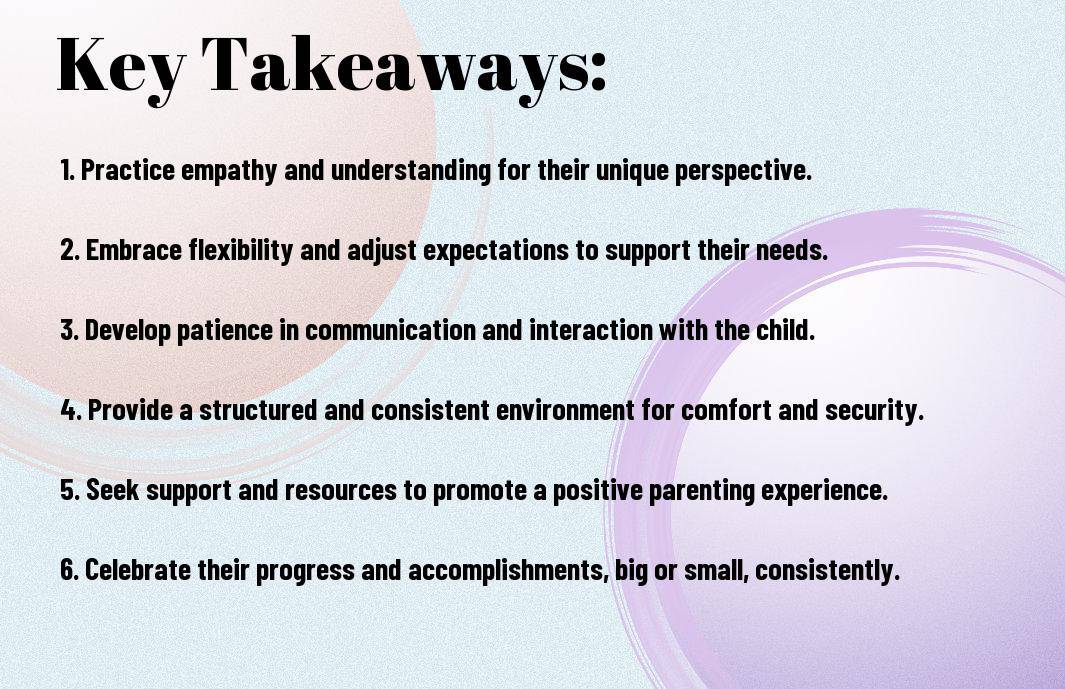Palpable challenges often accompany the task of raising a child with autism. Patience and understanding are paramount in navigating the unique complexities that come with parenting a child on the autism spectrum. It is crucial to acknowledge the importance of emotional regulation and positive reinforcement in facilitating the growth and development of children with autism.
For more insights on guiding children with autism and nurturing patience through the journey of parenting, check out Building Patience in Children with Autism.
Key Takeaways:
- Cultivating patience: It is crucial for parents of children with autism to continuously practice patience, understanding that progress may take time and setbacks are normal. Patience is key in maintaining a supportive and nurturing environment for the child.
- Developing understanding: Educating oneself about autism and its impact on a child’s behaviour is important in fostering a deeper understanding. This understanding can lead to more effective communication, problem-solving, and ultimately, a better relationship with the child.
- Seeking support: Parents should not be afraid to seek assistance from professionals, support groups, and other parents in similar situations. Building a network of support can provide valuable insight, practical tips, and emotional support for both the child and the parents.

Understanding Autism
Understanding autism is crucial for parents who are raising a child on the spectrum. It is important to have a comprehensive understanding of the condition in order to provide the best support and care for children with autism.
Defining Autism Spectrum Disorder
Autism Spectrum Disorder (ASD) is a complex neurodevelopmental condition that manifests in early childhood and affects the individual’s ability to communicate, interact with others, and behave appropriately in social situations. It is a spectrum disorder, meaning that it presents itself in a wide range of symptoms and severity levels. The core features of autism include challenges in social communication and interaction, as well as restricted and repetitive patterns of behaviour.
Common Challenges and Behaviors
Children with autism may exhibit a variety of challenging behaviours, such as difficulties with social interactions, sensory sensitivities, repetitive behaviours, and communication challenges. It is important for parents to be aware of these common challenges and behaviours in order to provide appropriate support and intervention for their child.
Understanding these common challenges and behaviours is essential for parents to create a supportive and understanding environment for their child with autism. It is important to approach these challenges with patience, empathy, and a willingness to learn, in order to best support the unique needs of children on the autism spectrum.

Strategies for Cultivating Patience
Parenting a child with autism can present unique challenges that require a great deal of patience. Here are some strategies that can help parents cultivate patience and understanding.
Mindfulness and Stress Reduction Techniques
One effective way to cultivate patience is through mindfulness and stress reduction techniques. This may include practices such as meditation, deep breathing exercises, and yoga. By learning to be more present in the moment and managing stress levels, parents can develop the patience needed to navigate the challenges of parenting a child with autism. These techniques can also help parents stay calm and composed in difficult situations, allowing them to respond to their child’s needs with empathy and understanding.
Creating a Supportive Environment
Creating a supportive environment for both the child with autism and the parents can also contribute to cultivating patience. This includes establishing routines and structure, providing a sensory-friendly space, and seeking support from family, friends, and professionals. When parents feel supported and their child’s environment is tailored to their unique needs, it reduces stress and fosters a more positive atmosphere that can lead to increased patience and understanding.
By implementing these strategies, parents can foster an environment that promotes patience and understanding for both themselves and their child with autism. This can ultimately strengthen the parent-child relationship and contribute to the overall wellbeing of the family.

Enhancing Understanding and Communication
For more tips on enhancing your understanding and communication with your child with autism, check out this helpful article on 8 Tips for Developing Patience with Your Child.
Communication Techniques with Autistic Children
When communicating with autistic children, it’s important to be patient and use clear, concise language. Non-verbal cues can also be effective in enhancing communication, so be sure to pay attention to your child’s body language and facial expressions. Visual aids such as picture cards or a visual schedule can also help in improving communication and understanding.
Educating Family and Community
It’s essential to educate your family and community about autism to create a supportive and understanding environment for your child. Providing information about autism, sharing personal experiences, and raising awareness can help foster a more inclusive and accommodating community for your child.
For more information on educating family and community about autism, visit our website or attend local workshops and seminars to gain further insights and resources. It’s important to advocate for your child and create a network of support within your family and community.
Practical Approaches to Daily Life
Structuring Routines and Expectations
When parenting a child with autism, establishing structured routines and clear expectations can significantly reduce stress and anxiety for both the child and the parent. Creating a visual schedule with pictures or words can help the child understand the sequence of daily activities and transitions. Use consistent routines for meals, bedtime, and other daily activities to provide a sense of stability and predictability.
Set clear and realistic expectations for your child, and communicate them in a simple and consistent manner. Use positive reinforcement and rewards to encourage adherence to routines and expectations, and be patient as your child adapts to the structured environment.
Managing Public Outings and Social Interactions
Public outings and social interactions can be challenging for children with autism. Before venturing into public spaces, prepare your child by discussing what to expect and how to manage potential overstimulation. Use visual supports, such as social stories or visual cues, to help your child understand appropriate behaviour in different social situations.
When in public, be attentive to your child’s signals of distress and be prepared to de-escalate any anxious or overwhelming situations. Maintain a calm and supportive demeanour to help your child feel secure in unfamiliar environments.
Managing public outings and social interactions is crucial for the well-being of children with autism. It’s important to be proactive in preparing your child for these situations and to be responsive to their needs in the moment. Patience and understanding will go a long way in supporting your child’s positive experiences in the community.
FAQ
Q: What is autism?
A: Autism, or autism spectrum disorder (ASD), refers to a broad range of conditions characterized by challenges with social skills, repetitive behaviours, speech and nonverbal communication.
Q: How can I cultivate patience in parenting a child with autism?
A: Cultivating patience involves understanding and accepting your child’s unique needs and differences, learning effective communication strategies, and seeking support from professionals, support groups, and other parents.
Q: What are some strategies for understanding a child with autism?
A: Understanding a child with autism involves educating yourself about the condition, observing and recognising your child’s triggers and behaviours, and engaging in open and empathetic communication with them.
Q: How can I promote a supportive environment for my child with autism?
A: Promoting a supportive environment involves creating a consistent routine, providing clear and structured communication, and offering opportunities for sensory regulation and positive social interactions.
Q: What role does empathy play in parenting a child with autism?
A: Empathy plays a crucial role in parenting a child with autism as it allows you to connect with and understand your child’s emotions, experiences, and perspectives, fostering a strong and supportive parent-child relationship.
Q: How can I manage my own stress and emotions while parenting a child with autism?
A: Managing stress and emotions involves engaging in self-care practices, seeking professional support and guidance, and developing coping strategies to navigate the unique challenges of parenting a child with autism.
Q: How can I advocate for my child’s needs in various settings, such as school or healthcare settings?
A: Advocating for your child’s needs involves understanding their rights and entitlements, effectively communicating with professionals and educators, and collaborating with them to create a supportive and inclusive environment for your child.







